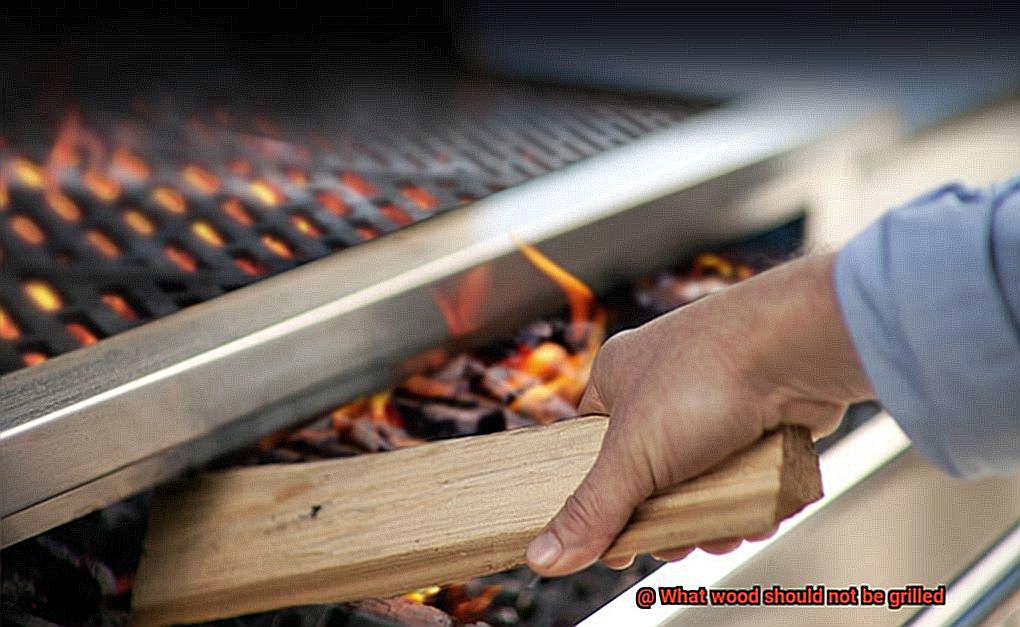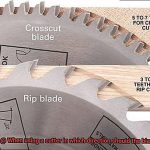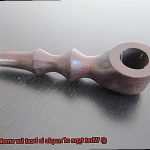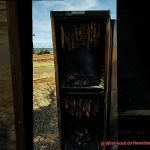Imagine this: it’s a warm summer night, the grill is hot, and you’re ready to wow your guests with your grilling prowess. You’ve got your meats and veggies prepped, but have you considered what type of wood you’re using? While wood can add a delicious smoky flavor to your food, not all woods are created equal when it comes to grilling.
In this blog post, we’ll take a deep dive into the world of grilling and explore which woods should never touch your grill grates. Whether you’re a seasoned grill master or a newbie looking to up your game, knowing which woods to avoid is crucial for both taste and safety.
We’ll break down some commonly used woods in grilling and explain why they’re not suitable for cooking over an open flame. Plus, we’ll offer up some safer alternatives that will still give you that signature smoky flavor without putting anyone at risk.
So before you light up that grill again, read on to learn about the telltale signs of dangerous wood and how to keep everyone safe while still achieving mouthwatering results. Let’s get started.
Contents
Chemically-Treated Woods: What to Avoid
Grilling is a beloved pastime for many, but it’s important to be mindful of the type of wood being used. Chemically-treated woods, such as those treated with creosote, pentachlorophenol (PCP), and chromated copper arsenate (CCA) are a big no-no when it comes to grilling. These chemicals are used to protect the wood from insects and decay, but when burned, they can release harmful toxins into the air and contaminate the food being grilled.
Creosote, a commonly used chemical for preserving wood, is often found in railroad ties, telephone poles, and fence posts. When exposed to high heat, creosote-treated wood releases polycyclic aromatic hydrocarbons (PAHs) into the air, which can be detrimental to human health. PAH contamination can also occur when ingesting food that has been grilled with creosote-treated wood.
Pressure-treated wood is another type of chemically-treated wood that should be avoided when grilling. While it may be more durable and resistant to insects and rot, the chemicals used in pressure treatment can release toxic fumes when exposed to high heat. Painted or stained woods should also be avoided when grilling, as they may contain harmful substances that can be released when exposed to high heat.
To ensure the safety of your food and the environment, it’s best to stick with natural hardwoods such as oak, hickory, mesquite, applewood, cherrywood, or pecan. These woods are safe for grilling and add delicious flavor to the food. It’s crucial to read labels carefully when purchasing wood for grilling and ensure that they are free from any chemical treatments.
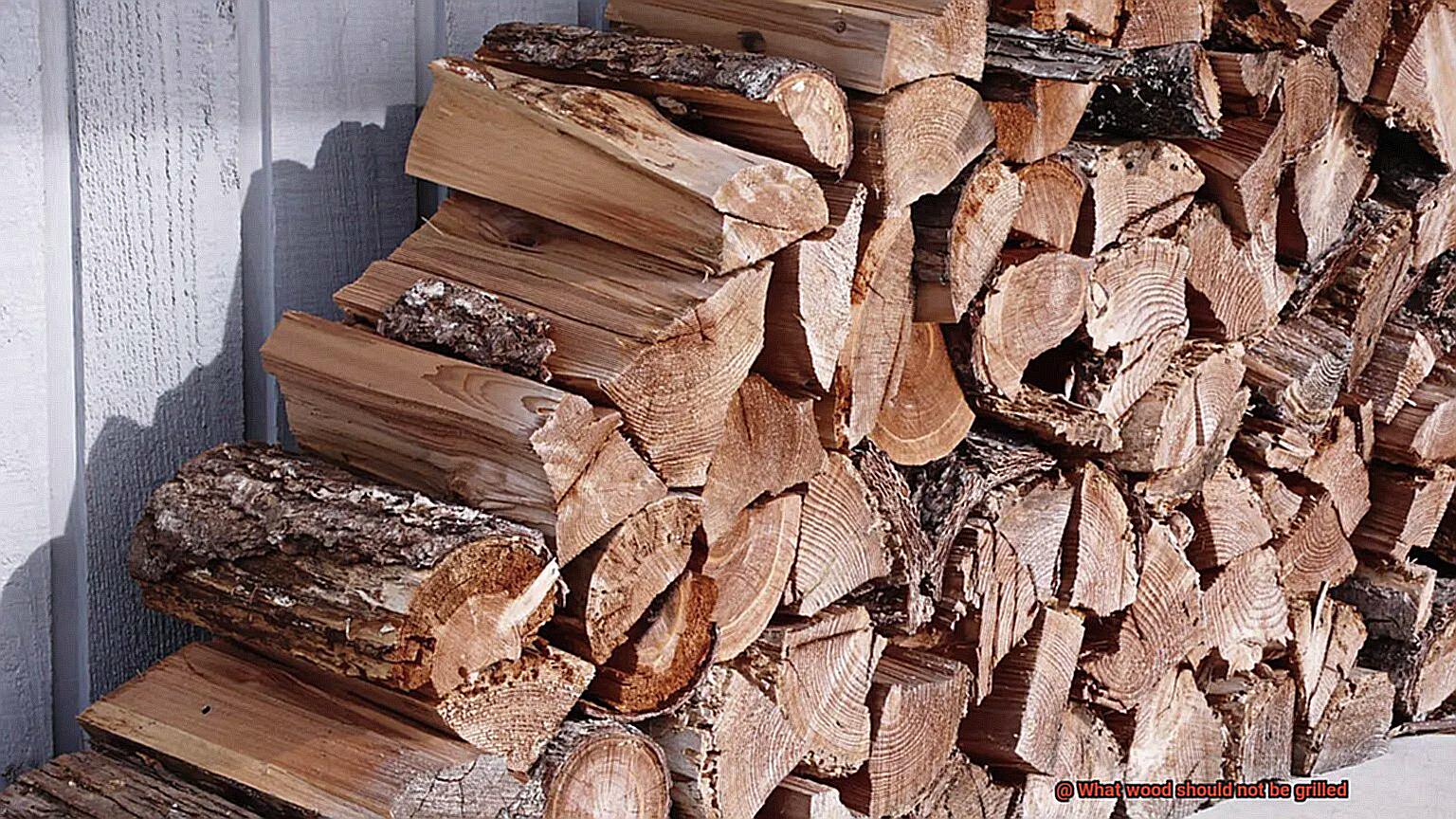
Choosing natural hardwoods over chemically-treated woods not only ensures the safety of your food but also helps protect the environment by avoiding exposure to harmful chemicals.
Toxic Woods: Smoky Hazards
Grilling with wood is a delicious way to infuse your food with unique flavors, but not all woods are created equal. As an expert on toxic woods and smoky hazards, I know that some woods can produce toxic smoke that can be harmful to your health. So, it’s crucial to know which woods to avoid when grilling and prevent any potential health risks.
Poison oak, poison ivy, and poison sumac are among the top woods that should never be used for grilling. These woods contain urushiol, a toxic oil that causes an allergic reaction in many people. When burned, the smoke from these woods can cause severe respiratory problems and skin irritation.
Oleander is another type of wood that should be avoided at all costs. This plant contains toxic compounds called cardiac glycosides, which can cause heart problems and even death if ingested or inhaled. When burned, the smoke from oleander can be extremely dangerous and should not be used for grilling.
Yew wood is yet another type of wood that should not be used for grilling. This wood contains taxine, a toxic alkaloid that can cause vomiting, diarrhea, and even death in some cases. When burned, the smoke from yew wood can be extremely toxic and should be avoided at all costs.
It’s also important to steer clear of any wood that has been treated with chemicals like paint, stain, or varnish. These chemicals can release toxic fumes when burned and cause serious health problems.
For safe and healthy grilling practices, stick with natural hardwoods like hickory, mesquite, or oak. Not only do these woods produce a delicious smoky flavor without any of the potential health risks, but they also protect the environment.
Painted or Stained Woods: Unsafe Coatings
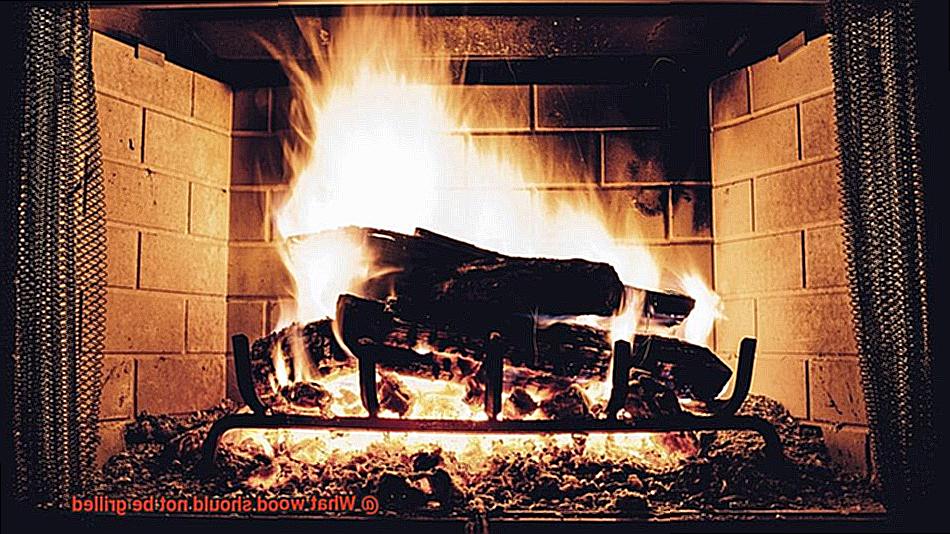
Grilling is a beloved pastime for many, but it’s important to be mindful of the potential dangers that lurk in unexpected places. One such hazard is painted or stained woods, which can contain harmful chemicals that are released into the air and onto your food when heated. These chemicals can cause respiratory issues if inhaled and severe health concerns if ingested.
It’s crucial to prioritize safety when grilling, and avoiding painted or stained woods is a simple step you can take to protect yourself and your loved ones. Instead, opt for natural wood options like cedar, hickory, maple, or oak that are untreated and free from harmful coatings. Not only will these options be safer for cooking, but they will also prevent any harmful chemicals from seeping into your food or the air.
It’s also important to note that pressure-treated wood should never be used for grilling either. This type of wood is treated with chemicals to prevent decay and insect damage, making it unsuitable for cooking food.
If you’re unsure about whether your wood contains paint or stain, it’s best to err on the side of caution and avoid using it altogether. In addition to avoiding unsafe coatings, always follow proper safety precautions when grilling. Keep a fire extinguisher nearby, use clean utensils and a clean grill, and never leave the grill unattended while in use.
Hardwoods for Grilling: The Best Choice
When it comes to grilling, the type of wood you choose can make all the difference. Hardwoods, in particular, are the best choice for grilling because they burn hotter and longer than softwoods, while also infusing your food with a delicious smoky flavor that is hard to resist.
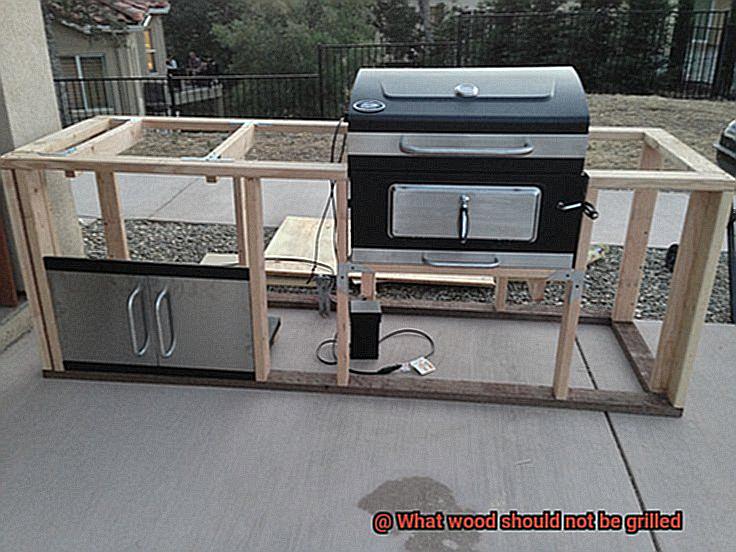
If you’re wondering which hardwoods are best for grilling, look no further than oak, hickory, mesquite, and maple. These woods are dense and burn slowly, providing a consistent heat source that will cook your food to perfection. Not only that, but each of these hardwoods imparts its own unique flavor to your dishes. Oak has a robust taste, hickory adds a strong smoky flavor, mesquite has a slightly sweet taste, and maple adds a subtle sweetness that complements many different foods.
However, not all hardwoods are created equal when it comes to grilling. For example, you should never use pine wood for grilling because it contains high levels of sap and resin that can make your food bitter and even toxic if ingested in large quantities. Similarly, cedar should be used sparingly because its oils can be harmful if consumed in large amounts and its strong flavor can overpower other flavors in your dish.
It’s also important to avoid using any wood that has been treated with chemicals or pesticides because these can release harmful toxins when burned and be dangerous to ingest. Instead, stick with natural hardwoods that are specifically intended for grilling.
Oak: A Popular Hardwood for Grilling
When it comes to grilling, oak wood is a popular choice due to its robust flavor and ability to burn hot and long. However, not all oak wood is suitable for grilling. To ensure that your BBQ is a success, it’s important to choose the right type of oak wood and to ensure that it’s safe and properly seasoned.
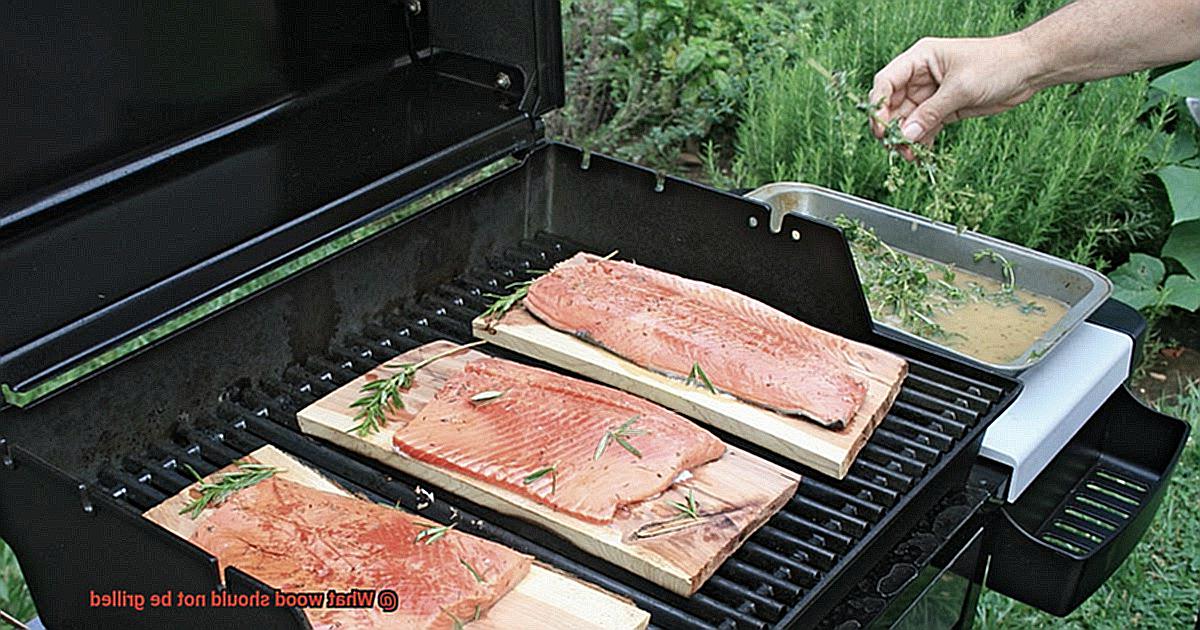
Firstly, it’s crucial to choose white oak for grilling as it has a milder flavor compared to red oak. This produces a more desirable smoke that won’t overpower your food. Secondly, avoid using softwoods such as pine, cedar, and spruce as they contain high levels of resin that can produce harmful chemicals when burned.
Furthermore, never use treated wood for grilling as it can release toxic fumes when burned. Always opt for properly seasoned wood that is dry as wet or green wood can produce excessive smoke and an unpleasant flavor. Chunks or chips are the preferred choice over logs as they are easier to handle and provide a consistent flavor.
Hickory: An Intensely Flavored Hardwood
The aroma of hickory wood is strong, and its sweet, smoky taste can enhance the flavor of your food. However, there are some important things to keep in mind before firing up the grill.
Firstly, hickory wood is not for everyone. Its robust flavor can easily overpower milder meats like chicken or fish. It’s best suited for heartier meats like beef, pork, or lamb. If you do want to use it for milder meats, it’s important to use it sparingly and in combination with other woods like apple or cherry to balance out the flavor profile.
Another consideration is the amount of smoke hickory wood can produce. If you’re grilling in an enclosed space, the smoke can cause irritation to your eyes and lungs, making it difficult to breathe. It’s essential to ensure your grilling area is well ventilated before using hickory wood.
Finally, it’s crucial to ensure that your hickory wood is properly seasoned. Green or unseasoned hickory wood can produce a bitter taste that can ruin the flavor of your food. Always make sure your wood is dry and has been properly cured before using it for grilling.
Maple: An All-Purpose Hardwood with a Sweet Flavor
Looking for a hardwood that can add a sweet and mild flavor to your grilled or smoked meats? Maple wood is the answer. Maple is a versatile and popular choice for many different types of foods. Not only does it have a unique sweet flavor that pairs well with a variety of meats, but it also produces a mild smoke that won’t overpower the taste of your food. Let’s dive into the characteristics that make maple wood the perfect all-purpose hardwood.
Hard Maple vs. Soft Maple
Not all maple wood is created equal when it comes to grilling and smoking. Soft maple, also known as silver maple or red maple, should be avoided as it can produce an unpleasant taste and bitter smoke when burned. Stick to hard maple, also known as sugar maple, for the best results. Hard maple is denser and has a tighter grain structure which makes it ideal for smoking and grilling.
Seasoned Wood is Key
When using maple wood for grilling, it’s important to use dry wood that has been properly seasoned. Wet or green wood can produce excessive smoke and ruin the taste of your food. Seasoned wood will produce consistent heat and smoke which will give your food a delicious flavor.
Avoid Treated Wood
It’s important to avoid using wood that has been treated with chemicals or paint. These chemicals can seep into your food and be harmful to your health. Always use untreated wood for grilling and smoking.
Versatility is Key
Maple wood is incredibly versatile and can be used for many different types of foods. It pairs well with pork, beef, chicken, fish, vegetables, and even fruits like apples. Maple wood is also a popular choice for making maple syrup, so it’s no surprise that it adds a sweet and delicious flavor to your grilled goods.
eUJAyqNX31c” >
Also Read: Is Red Oak Good for Smoking Meat?
Conclusion
Grilling is more than just a cooking method; it’s a social event that brings people together over mouth-watering food. However, not all woods are created equal when it comes to grilling. Some can be downright dangerous, while others can add an unpleasant taste to your food.
When it comes to safety, chemically-treated woods like creosote, pentachlorophenol (PCP), and chromated copper arsenate (CCA) should never be used for grilling. These woods release harmful toxins into the air and contaminate the food being grilled. Likewise, toxic woods like poison oak, poison ivy, and poison sumac can cause severe respiratory problems and skin irritation when burned.
To ensure a safe grilling experience, always prioritize safety by avoiding painted or stained woods that contain harmful chemicals. Instead, opt for natural hardwoods such as oak, hickory, mesquite, maple, applewood, cherrywood or pecan that add delicious flavor without putting anyone at risk.
Hardwoods are the best choice for grilling because they burn hotter and longer than softwoods while also infusing your food with a unique smoky flavor. However, it’s crucial to choose properly seasoned wood that is dry and free from any chemical treatments.
Remember to follow proper safety precautions when grilling by keeping a fire extinguisher nearby, using clean utensils and a clean grill, and never leaving the grill unattended while in use.
In summary, choosing the right type of wood for grilling is essential for both taste and safety. By following these guidelines and opting for natural hardwoods free from any harmful chemicals or treatments, you can ensure a safe and delicious grilling experience every time.

